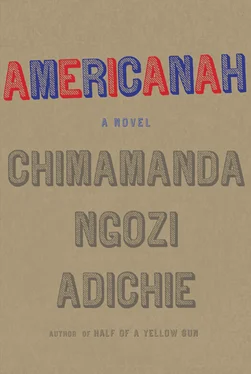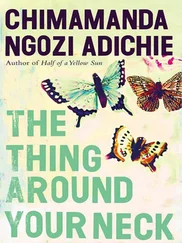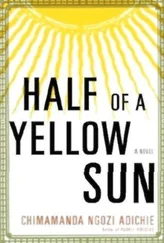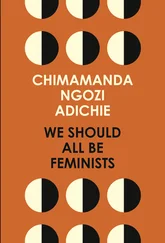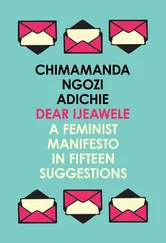
AS SOON AS they arrived at Chief’s party, Kosi led the way around the room, hugging men and women she barely knew, calling the older ones “ma” and “sir” with exaggerated respect, basking in the attention her face drew but flattening her personality so that her beauty did not threaten. She praised a woman’s hair, another’s dress, a man’s tie. She said “We thank God” often. When one woman asked her, in an accusing tone, “What cream do you use on your face? How can one person have this kind of perfect skin?” Kosi laughed graciously and promised to send the woman a text message with details of her skin-care routine.
Obinze had always been struck by how important it was to her to be a wholesomely agreeable person, to have no sharp angles sticking out. On Sundays, she would invite his relatives for pounded yam and onugbu soup and then watch over to make sure everyone was suitably overfed. Uncle, you must eat o! There is more meat in the kitchen! Let me bring you another Guinness! The first time he took her to his mother’s house in Nsukka, just before they got married, she leaped up to help with serving the food, and when his mother made to clean up afterwards, she got up, offended, and said, “Mummy, how can I be here and you will be cleaning?” She ended every sentence she spoke to his uncles with “sir.” She put ribbons in the hair of his cousins’ daughters. There was something immodest about her modesty: it announced itself.
Now she was curtseying and greeting Mrs. Akin-Cole, a famously old woman from a famously old family, who had the supercilious expression, eyebrows always raised, of a person used to receiving homage; Obinze often imagined her belching champagne bubbles.
“How is your child? Has she started school?” Mrs. Akin-Cole asked. “You must send her to the French school. They are very good, very rigorous. Of course they teach in French but it can only be good for the child to learn another civilized language, since she already learns English at home.”
“Okay, ma. I’ll look at the French school,” Kosi said.
“The French school is not bad, but I prefer Sidcot Hall. They teach the complete British curriculum,” said another woman, whose name Obinze had forgotten. He knew she had made a lot of money during General Abacha’s government. She had been a pimp, as the story went, providing young girls for the army officers who, in turn, gave her inflated supply contracts. Now, in her tight sequinned dress that outlined the swell of her lower belly, she had become a certain kind of middle-aged Lagos woman, dried up by disappointments, blighted by bitterness, the sprinkle of pimples on her forehead smothered in heavy foundation.
“Oh, yes, Sidcot Hall,” Kosi said. “It’s already on top of my list because I know they teach the British curriculum.”
Obinze would ordinarily not have said anything at all, just watched and listened, but today, for some reason, he said, “Didn’t we all go to primary schools that taught the Nigerian curriculum?”
The women looked at him; their puzzled expressions implied that he could not possibly be serious. And in some ways, he was not. Of course he, too, wanted the best for his daughter. Sometimes, like now, he felt like an intruder in his new circle, of people who believed that the latest schools, the latest curriculums, would ensure the wholeness of their children. He did not share their certainties. He spent too much time mourning what could have been and questioning what should be.
When he was younger, he had admired people with moneyed childhoods and foreign accents, but he had come to sense an unvoiced yearning in them, a sad search for something they could never find. He did not want a well-educated child enmeshed in insecurities. Buchi would not go to the French school, of that he was sure.
“If you decide to disadvantage your child by sending her to one of these schools with half-baked Nigerian teachers, then you only have yourself to blame,” Mrs. Akin-Cole said. She spoke with the unplaceable foreign accent, British and American and something else all at once, of the wealthy Nigerian who did not want the world to forget how worldly she was, how her British Airways executive card was choking with miles.
“One of my friends, her son goes to a school on the mainland and do you know, they have only five computers in the whole school. Only five!” the other woman said. Obinze remembered her name now. Adamma.
Mrs. Akin-Cole said, “Things have changed.”
“I agree,” Kosi said. “But I also see what Obinze is saying.”
She was taking two sides at once, to please everyone; she always chose peace over truth, was always eager to conform. Watching her now as she talked to Mrs. Akin-Cole, the gold shadow on her eyelids shimmering, he felt guilty about his thoughts. She was such a devoted woman, such a well-meaning, devoted woman. He reached out and held her hand.
“We’ll go to Sidcot Hall and the French school, and also look at some Nigerian schools like Crown Day,” Kosi said, and looked at him with a plea.
“Yes,” he said, squeezing her hand. She would know it was an apology, and later, he would apologize properly. He should have kept quiet, left her conversation unruffled. She often told him that her friends envied her, and said he behaved like a foreign husband, the way he made her breakfast on weekends and stayed home every night. And, in the pride in her eyes, he saw a shinier, better version of himself. He was about to say something to Mrs. Akin-Cole, something meaningless and mollifying, when he heard Chief’s raised voice behind him: “But you know that as we speak, oil is flowing through illegal pipes and they sell it in bottles in Cotonou! Yes! Yes!”
Chief was upon them.
“My beautiful princess!” Chief said to Kosi, and hugged her, pressing her close; Obinze wondered if Chief had ever propositioned her. It would not surprise him. He had once been at Chief’s house when a man brought his girlfriend to visit, and when she left the room to go to the toilet, Obinze heard Chief tell the man, “I like that girl. Give her to me and I will give you a nice plot of land in Ikeja.”
“You look so well, Chief,” Kosi said. “Ever young!”
“Ah, my dear, I try, I try.” Chief jokingly tugged at the satin lapels of his black jacket. He did look well, spare and upright, unlike many of his peers who looked like pregnant men.
“My boy!” he said to Obinze.
“Good evening, Chief.” Obinze shook his hand with both hands, bowing slightly. He watched the other men at the party bow, too, clustering around Chief, jostling to outlaugh one another when Chief made a joke.
The party was more crowded. Obinze looked up and saw Ferdinand, a stocky acquaintance of Chief’s who had run for governor in the last elections, had lost, and, as all losing politicians did, had gone to court to challenge the results. Ferdinand had a steely, amoral face; if one examined his hands, the blood of his enemies might be found crusted under his fingernails. Ferdinand’s eyes met his and Obinze looked away. He was worried that Ferdinand would come over to talk about the shady land deal he had mentioned the last time they ran into each other, and so he mumbled that he was going to the toilet and slipped away from the group.
At the buffet table, he saw a young man looking with sad disappointment at the cold cuts and pastas. Obinze was drawn to his gaucheness; in the young man’s clothes, and in the way that he stood, was an outsiderness he could not shield even if he had wanted to.
“There’s another table on the other side with Nigerian food,” Obinze told him, and the young man looked at him and laughed in gratitude. His name was Yemi and he was a newspaper journalist. Not surprising; pictures from Chief’s parties were always splattered in the weekend papers.
Читать дальше
